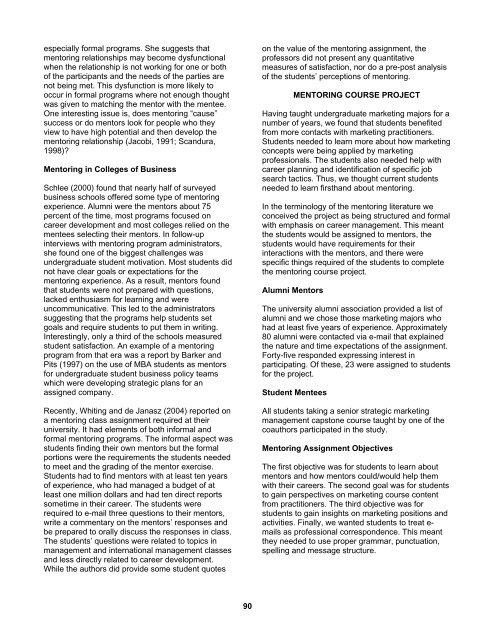2008 - Marketing Educators' Association
2008 - Marketing Educators' Association
2008 - Marketing Educators' Association
You also want an ePaper? Increase the reach of your titles
YUMPU automatically turns print PDFs into web optimized ePapers that Google loves.
especially formal programs. She suggests that<br />
mentoring relationships may become dysfunctional<br />
when the relationship is not working for one or both<br />
of the participants and the needs of the parties are<br />
not being met. This dysfunction is more likely to<br />
occur in formal programs where not enough thought<br />
was given to matching the mentor with the mentee.<br />
One interesting issue is, does mentoring “cause”<br />
success or do mentors look for people who they<br />
view to have high potential and then develop the<br />
mentoring relationship (Jacobi, 1991; Scandura,<br />
1998)?<br />
Mentoring in Colleges of Business<br />
Schlee (2000) found that nearly half of surveyed<br />
business schools offered some type of mentoring<br />
experience. Alumni were the mentors about 75<br />
percent of the time, most programs focused on<br />
career development and most colleges relied on the<br />
mentees selecting their mentors. In follow-up<br />
interviews with mentoring program administrators,<br />
she found one of the biggest challenges was<br />
undergraduate student motivation. Most students did<br />
not have clear goals or expectations for the<br />
mentoring experience. As a result, mentors found<br />
that students were not prepared with questions,<br />
lacked enthusiasm for learning and were<br />
uncommunicative. This led to the administrators<br />
suggesting that the programs help students set<br />
goals and require students to put them in writing.<br />
Interestingly, only a third of the schools measured<br />
student satisfaction. An example of a mentoring<br />
program from that era was a report by Barker and<br />
Pits (1997) on the use of MBA students as mentors<br />
for undergraduate student business policy teams<br />
which were developing strategic plans for an<br />
assigned company.<br />
Recently, Whiting and de Janasz (2004) reported on<br />
a mentoring class assignment required at their<br />
university. It had elements of both informal and<br />
formal mentoring programs. The informal aspect was<br />
students finding their own mentors but the formal<br />
portions were the requirements the students needed<br />
to meet and the grading of the mentor exercise.<br />
Students had to find mentors with at least ten years<br />
of experience, who had managed a budget of at<br />
least one million dollars and had ten direct reports<br />
sometime in their career. The students were<br />
required to e-mail three questions to their mentors,<br />
write a commentary on the mentors’ responses and<br />
be prepared to orally discuss the responses in class.<br />
The students’ questions were related to topics in<br />
management and international management classes<br />
and less directly related to career development.<br />
While the authors did provide some student quotes<br />
90<br />
on the value of the mentoring assignment, the<br />
professors did not present any quantitative<br />
measures of satisfaction, nor do a pre-post analysis<br />
of the students’ perceptions of mentoring.<br />
MENTORING COURSE PROJECT<br />
Having taught undergraduate marketing majors for a<br />
number of years, we found that students benefited<br />
from more contacts with marketing practitioners.<br />
Students needed to learn more about how marketing<br />
concepts were being applied by marketing<br />
professionals. The students also needed help with<br />
career planning and identification of specific job<br />
search tactics. Thus, we thought current students<br />
needed to learn firsthand about mentoring.<br />
In the terminology of the mentoring literature we<br />
conceived the project as being structured and formal<br />
with emphasis on career management. This meant<br />
the students would be assigned to mentors, the<br />
students would have requirements for their<br />
interactions with the mentors, and there were<br />
specific things required of the students to complete<br />
the mentoring course project.<br />
Alumni Mentors<br />
The university alumni association provided a list of<br />
alumni and we chose those marketing majors who<br />
had at least five years of experience. Approximately<br />
80 alumni were contacted via e-mail that explained<br />
the nature and time expectations of the assignment.<br />
Forty-five responded expressing interest in<br />
participating. Of these, 23 were assigned to students<br />
for the project.<br />
Student Mentees<br />
All students taking a senior strategic marketing<br />
management capstone course taught by one of the<br />
coauthors participated in the study.<br />
Mentoring Assignment Objectives<br />
The first objective was for students to learn about<br />
mentors and how mentors could/would help them<br />
with their careers. The second goal was for students<br />
to gain perspectives on marketing course content<br />
from practitioners. The third objective was for<br />
students to gain insights on marketing positions and<br />
activities. Finally, we wanted students to treat emails<br />
as professional correspondence. This meant<br />
they needed to use proper grammar, punctuation,<br />
spelling and message structure.


